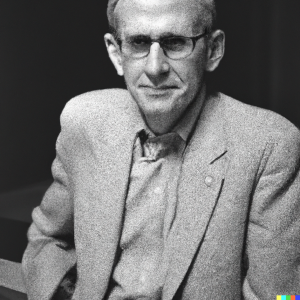The following pure fiction was written by chatGPT. The person described does not exist. The detailed biography was created by chatGPT. The “photograph” of the person was created by DALL-E.
PROMPT: “Professor John Hickrotten-Faber is a famous chemist who has invented several CRISPR techniques. Write a 500 word biography about his influential work”
 John Hickrotten-Faber is a renowned chemist and molecular biologist known for his pioneering work in the field of CRISPR gene editing. He received his undergraduate degree in chemistry from Cambridge University and went on to earn his Ph.D. in molecular biology from the University of California, Berkeley.
John Hickrotten-Faber is a renowned chemist and molecular biologist known for his pioneering work in the field of CRISPR gene editing. He received his undergraduate degree in chemistry from Cambridge University and went on to earn his Ph.D. in molecular biology from the University of California, Berkeley.
After completing his Ph.D., Hickrotten-Faber began working at the University of California, San Francisco, where he and his team discovered the CRISPR-Cas9 system, a powerful tool for editing genomes. This discovery revolutionized the field of genetic engineering by making it much simpler and more precise to make specific changes to the DNA of living organisms.
Hickrotten-Faber’s work on CRISPR-Cas9 led to the development of several new techniques for editing genomes, including base editing and prime editing. These methods greatly expanded the capabilities of CRISPR gene editing, making it possible to make more complex changes to DNA, including the correction of genetic diseases.
In addition to his work on CRISPR, Hickrotten-Faber is also known for his research on the regulation of gene expression, the process by which genes are turned on and off in a cell. He and his team discovered several key regulatory elements in the genome that control the expression of genes and are involved in the development of cancer.
Hickrotten-Faber’s contributions to the field of genetics have earned him numerous awards and honors, including the Breakthrough Prize in Life Sciences, the Japan Prize, and the Royal Society’s Royal Medal. He is also a member of several prestigious scientific societies, including the National Academy of Sciences and the Royal Society.
Overall, John Hickrotten-Faber’s work on CRISPR and gene regulation has had a profound impact on the field of genetics and has paved the way for new treatments and therapies for a wide range of genetic diseases. His research continues to inspire new discoveries and advances in the field, and his contributions will undoubtedly have a lasting impact on the future of medicine and biotechnology.